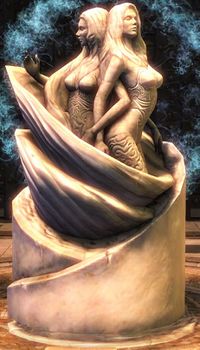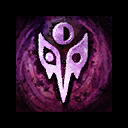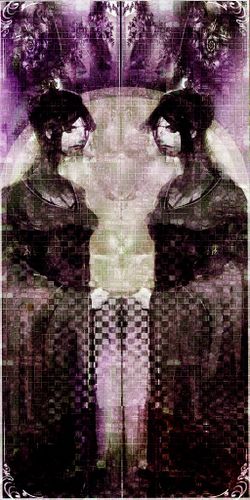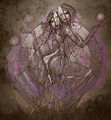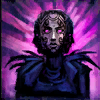Lyssa
“Lyssa, when gazing upon you. I see beauty, but it is ephemeral. The illusions fade upon your passing, and leave me to wonder if I ever knew you at all. And yet, I knew I could not look away.
Lyssa is the dual-faced goddess of beauty, water, and illusion. Though she is typically referred to as a singular entity, she is often depicted as twins known as Ilya and Lyss. Whether she is truly one entity, two, or some paradoxical combination is unknown. While Lyssa's various names are known, her origins are not.[1] Before The Cataclysm, Orrians worshipped Lyssa at the Cathedral of Eternal Radiance. In the present day the Church of Lyssa worships the Goddess of Beauty.
Lyssa is considered by most to be the paragon of all beauty, and many young men have glanced at her statues only to be entranced and die of thirst days later.[2] She is also considered to be related to chaos and non-specific elemental energy; she was only openly tied to water after the death of Abaddon in 1075 AE. It is said that displays of art and culture please Lyssa, but her wrath is terrible to behold. By her whims, her enemies are brutalized by despair and hopelessness, while her beautiful followers are elevated to heights of rapture.[3] The norn refer to Lyssa as a Spirit of Action.[4]
Biography[edit]
Life on Tyria[edit]
Lyssa's origins are unknown.[1] As such, it is not known if she was already among the Six Gods when they brought humanity to Tyria from the Mists, or only appeared after some humans had settled in Cantha in 786 BE.[5][6] With the urging of Balthazar, the God of War, humanity began claiming Tyria for themselves at the expense of the native Tyrian races. However, the natives resisted human expansion better than the God of War had expected. Despite this, humanity proved to be resilient and spread to Orr, Elona and beyond in the following centuries.
According to the Orrian history scrolls, Lyssa brought with her the hope and beauty of humanity. While the other gods focused on building Arah and beginning a new future, she gave them joy and helped them forget the past. Lyssa was greatly celebrated in Vabbi before the second rise of Palawa Joko, having the Festival of Lyss dedicated to her, and a beautiful lake was named the Mirror of Lyss in her honor. People of Vabbi believed that the free-floating Seborhin tree, magically suspended above the Seborhin Circle in the Garden of Seborhin, was Lyssa's favorite tree in the world and grew in the light of the goddess's smile. Should one of its leaves fall upon a person, it was believed that Lyssa would be watching over them.[7]
As Orrians worked on building the great city of Arah for the gods, Abaddon, the God of Knowledge, designed a set of magically warded reliquaries where the gods could keep their priceless and powerful artifacts, relics and knowledge safe from thieves and defilers. Lyssa was given one of these reliquaries.[8] During this time the gods gathered various powerful and ancient artifacts from around the world, including the original Bloodstone and the Mystic Telescope, and brought them for safekeeping and study in Arah.[9] Members of the Church of Lyssa dedicated themselves to the Goddess of Beauty and worshiped her at the Cathedral of Eternal Radiance. Like other members of the Six, Lyssa had a dirge dedicated to her which was sung by the Sirens of Orr.[10] In the Echovald Forest of Cantha, House Brauer of the Kurzicks were a family of great artists who became primarily devoted to Lyssa.[11]
At some point the gods became aware of the existence of the hibernating Elder Dragons, who were tied to the magical balance of Tyria, and learned their names and spheres of influence. This information was documented in what would come to be known as the Scroll of the Five True Gods.[12]
According to her scriptures, Lyssa disguised herself as a disease-ridden, malformed young woman and entered the village of Wren in Orr seeking shelter and employment. She was turned away by many villagers who were worried that she might infect them with a plague, however, despite her pleas for aid. Eventually one of the villagers, a young woman called Sara, showed compassion and offered to help the sickened visitor who revealed herself as the goddess in response. Realizing the truth, the people of Wren begged for Lyssa's mercy. The goddess blessed Sara with her gifts while delivering everyone present a lesson on how true beauty should not be measured by appearance but by actions and deeds.
The gods lived for a time among their followers in Arah. However, their radiance blinded mortals who gazed upon them for too long whenever the gods appeared among their followers. The gods eventually decided to retreat from public, and Dwayna, the Goddess of Life, commissioned the Orrian sculptor Malchor to make a statue of each god. As the statues were completed, the respective gods depicted in the statues retreated into Arah one by one.[13]
According to the Orrian history scrolls, Lyssa had been living veiled and hidden in the village of Wren for a time, however, and wept when she was commanded to join the other gods. Around 48 BE,[14] the old and tyrannical God of Death, Dhuum, was overthrown by Dwayna's half-god son Grenth who ascended to godhood and was welcomed by the gods as the new member of the Six.
Exodus of the Gods[edit]
According to an ancient Ascalonian legend and an Orrian scroll, the gods formulated a magical ritual and gifted three holy artifacts needed to enact and reverse it—a magical crown, Balthazar's own sword Sohothin and its twin Magdaer—to the royal human lineage as protection against invasion. The artifacts, as well as the knowledge how to use them in the ritual, would eventually pass on to the Ascalonian line of human kings.[15][16]
In 1 BE, the Six decided to gift magic to the mortal races. The gift of magic made the mortal races greedy, however, and led to devastating wars. King Doric, who had become the ruler of Tyria's united human tribes, journeyed to Arah and asked for the Six to put an end to the bloodshed. In response to the king's plea, the gods shattered the original Bloodstone and divided the magic in the world into five lesser Bloodstones to prevent anyone from ever wielding power over all magic again. According to the History of Tyria, the gods sealed the stones with Doric's blood and placed his bloodline in charge of guarding the stones.[17]
Abaddon turned against his fellow gods because of a disagreement over the gifting of magic among many other escalating events that followed the sealing of the Bloodstones. The rebellious god and his army of Margonites were defeated after their failed assault; however, the gods' victory came at the cost of the Crystal Sea turning into the Crystal Desert and a once plentiful land becoming the sulfurous Desolation. Balthazar himself forged the chains that bound the fallen god in the Realm of Torment.
The Five realized the damage which the war against Abaddon and the gifting of magic from earlier had caused to the world and decided to leave humanity to stand or fall on its own merits without further meddling.[18] They departed from Tyria in 0 AE in an event known as the Exodus of the Gods. The Five entered the Mists and continued governing their respective realms from there although they did not sever their ties with Tyria completely as their power was still felt in the world for centuries to come.
At some point, Wintersday traditions, centered on the rivalries of the gods and the changing of the seasons which would symbolically determine whether darkness or light would reign following the coming of the new year, emerged among humanity. Avatars of the gods appeared on Tyria and asked participants to choose which of the two teams to side with for the festive, annual competition which would decide whether Dwayna or Grenth won. Dwayna, who was supported by Melandru, fought to return spring to the land and bring joy to the hearts of humanity via renewed life, while Grenth, who was supported by Balthazar, fought to prolong winter and offered a less frivolous outlook on life and somber reflection on death as part of the circle of life.[19] These festivities also included the Great Snowball Fight of the Gods.
Around this time, Dwayna's magic created the first Brrrls, or snowmen, to spread Wintersday cheer and hand out gifts from the Secret Lair of the Snowmen, while Grenth's magic caused unfortunate victims to transform into the mischievous Grentches who would spread misery in their wake as well as steal and hide gifts of innocent children in remote locations such as the Underworld.[20][21] Lyssa's role in Wintersday festivities is unknown.
Conflicts in the Mists[edit]
When Abaddon began Nightfall in order to break free from his prison, the gods chose not to intervene directly. However, the Five gave a blessing and words of encouragement to Spearmarshal Kormir's party via their avatars as the mortal heroes entered the Realm of Torment to defeat Abaddon once and for all.
| After Kormir had successfully absorbed the vanquished Abaddon's rampant magic and ascended to godhood at the end of Nightfall in 1075 AE, the temporary spike in magic was enough to stir Primordus and begin the next cycle of Elder Dragon awakenings. Most of the gods advocated for severing ties with Tyria for good and leaving its inhabitants to face the calamity on their own as the gods' interference would only make matters worse. Balthazar vehemently disagreed with his fellow gods, however. Having been more or less idle since the Exodus, the God of War craved for action and was more than willing to accept the challenge of facing the Elder Dragons in combat in order to add their power into his own.[22]
Disagreements led to arguments, and the angered Balthazar accused the other gods of being cowards and threatened to strike them down as well. Understanding that the God of War had to be stopped or his ambitions could lead to Tyria's destruction, the other gods joined forces and stripped Balthazar of his power, imprisoning him in the Mists where they intended to leave him in chains so he could never threaten anyone again. Balthazar felt betrayed and vowed to have his revenge on his fellow gods and make them scream their allegiance before he would end their lives and claim their power as his own.[23] The rest of the gods decided to continue with their original plan, leaving Balthazar in chains. Kormir did not immediately join the rest of the gods on their journey, choosing to remain in the Sanctum for a time to help her librarians record knowledge, and Lyssa mocked her for lingering behind.[24] Balthazar remained imprisoned until 1328 AE when Rytlock Brimstone happened upon his location while searching for the missing sword Sohothin. Balthazar reignited the sword, and the grateful Rytlock severed the fallen god's chains without realizing who the mysterious prisoner actually was and left the Mists through a portal which opened nearby. By the time Kormir realized that Balthazar had returned to Tyria and used Lyssa's enchanted mirror to masquerade as the mursaat Lazarus, the other gods had already departed.[23] After the Pact Commander, Kasmeer Meade, Marjory Delaqua and Taimi realized that the "Lazarus" they had been interacting with was an imposter, they hatched a plan to force the imposter to reveal his true self, which led to the mirror shattering and Balthazar shedding his mursaat disguise. Following Balthazar's departure for Draconis Mons to take on the Elder Dragon Primordus, Taimi recovered the broken mirror. Before the mirror was destroyed by Taimi, members of Dragon's Watch noted that it had Lyssa's signature sigils in its design, and contained powerful mesmer magic that seemed to have godly origins. Kasmeer claimed that the mirror had been enchanted by Lyssa herself.[25] When members of Dragon's Watch entered the Sanctum and spoke with Kormir, the Goddess of Truth mentioned that "even Lyssa" had voted to strip Balthazar of his power.[23]. Upon his defeat at the hands of the Pact Commander in the Battle of Kodash Bazaar, Balthazar could be heard cursing all of the gods—except for Lyssa. |
Scriptures[edit]
“And it was, that a stranger came to the village of Wren seeking shelter and employment. Though young in years, her body was stooped and twisted, her flesh eaten by disease. "Ye have the mark of plague upon ye," said the citizen named Gallrick. "Leave this place lest you sicken our people."
"I've lost my family and my home," cried the desperate woman. "Have you no heart?"
Yet each person, in turn, did look away.
Then from the crowd came a young woman, Sara. She looked upon the woman with pity. "If you need help," said Sara, "I will give it." And Sara did approach the gnarled, bent woman and did offer her a helping hand.
Then the sickened woman pulled from her body the robes of plague, revealing Herself to be the goddess Lyssa.
The people of Wren fell to their knees, begging Lyssa's mercy. But lifting Sara gently, saith She, "True beauty is measured not by appearance but by actions and deeds. Many have eyes, but few have seen. Of all here, you saw the beauty behind the illusion. And you alone shall be blessed with My gifts."
— Scriptures of Lyssa, 45 BE
“The two who are one, Issa and Lys,[sic] brought with her the hope and beauty of humanity. While the other gods focused on building Arah and beginning a new future, Lyssa gave them joy and helped them forget the past.
For a while she lived, veiled and hidden, in the village of Wren. When the building of Arah was completed Lyssa was commanded to join the other gods, though her tears fell like rain among the western road.
— Orrian History Scrolls, The Six, Volume 4—Lyssa: Goddess of Beauty and Illusion
“The road may be long, but you can walk it together.
There may be storms, but you can shelter one another.
The cold may come in winter, but you can shelter each other's warmth.
Each companion to the other: two souls, united.
May no weapon sever the bond that holds your hands together,
And may no word sever the love that keeps your hearts as one.
— Sacred text of Lyssa. Goddess of love
“From out of the darkness, there stepped a child into the campfire's light. And she said, "I am Lyssa, and I have come to teach you what is illusion and what is truth."
But the soldiers there did not believe her. They laughed and said, "If you're Lyssa, then show us your beauty, for we can surely use it on this dark night. We have lost hope that this war will end."
The child approached, and her smile held divine grace. "Share your food with me, and in return for your kindness, I will show you beauty the likes of you will never see again."
And so the kind soldiers did, and the child ate with ravenous hunger. When the last bone had been tossed aside, and the last bean swallowed, the child began to skip around the outside of the campfire.
She touched each man on his head, one at a time, as they laughed and jibed her until, one at a time, they fell into a deep slumber.
Each man dreamed a different dream, but each dream was a vision of the life they would lead once the war was over—wives, children, riches, open air, health, and peace.
And when they awoke upon the morrow, the child was gone and the enemy had arrived. They fought joyfully, with all their might, because they all remembered their dreams and knew they would win the war.
Each man put his heart and soul into the battle, and each man, one at a time, was slaughtered.
Gallery[edit]
- Concept art
Ancient Ascalonian mural of Lyssa.
Concept art of Lyssa's avatar by Kekai Kotaki.
- Miscellaneous
Guild emblem depicting Lyssa.
Related achievements[edit]
 Meteorlogicus III: Storm: Mental Discipline — Help the pact gain control of the Temple of Lyssa in Malchor's Leap.
Meteorlogicus III: Storm: Mental Discipline — Help the pact gain control of the Temple of Lyssa in Malchor's Leap. Quip III: Chaos Gun: Trickery of Ilya — Imbue a Superior Sigil of Mischief at the Statue of Lyssa near the Blighted Arch in Malchor's Leap.
Quip III: Chaos Gun: Trickery of Ilya — Imbue a Superior Sigil of Mischief at the Statue of Lyssa near the Blighted Arch in Malchor's Leap. Quip III: Chaos Gun: Trickery of Lyss — Imbue a Superior Sigil of Mischief at the Statue of Lyssa in Elysium Beach in Straits of Devastation.
Quip III: Chaos Gun: Trickery of Lyss — Imbue a Superior Sigil of Mischief at the Statue of Lyssa in Elysium Beach in Straits of Devastation. Quip III: Chaos Gun: Trickery of Lyssa — Imbue a Superior Sigil of Mischief at the Altar of Lyssa in the Cathedral of Eternal Radiance in Malchor's Leap.
Quip III: Chaos Gun: Trickery of Lyssa — Imbue a Superior Sigil of Mischief at the Altar of Lyssa in the Cathedral of Eternal Radiance in Malchor's Leap. The Dreamer III: The Lover: Dream of Lyssa — Found in the chest after cleansing the Cathedral of Eternal Radiance in Malchor's Leap.
The Dreamer III: The Lover: Dream of Lyssa — Found in the chest after cleansing the Cathedral of Eternal Radiance in Malchor's Leap. The Juggernaut I: The Experimental Hammer: Ponder the Cleansed Lyssa Temple — Ponder the Cathedral of Eternal Radiance after cleansing it of orrian corruption.
The Juggernaut I: The Experimental Hammer: Ponder the Cleansed Lyssa Temple — Ponder the Cathedral of Eternal Radiance after cleansing it of orrian corruption. The Moot III: The Energizer: Dance for Lyssa — Dance for Lyssa at the Altar of Lyssa, in her Temple in Orr.
The Moot III: The Energizer: Dance for Lyssa — Dance for Lyssa at the Altar of Lyssa, in her Temple in Orr. One Path Ends: Storyteller: Lyssa — Find all the pages of the Parable of Lyssa. (3)
One Path Ends: Storyteller: Lyssa — Find all the pages of the Parable of Lyssa. (3) The Desolation: Path of the Gods — Kneel at the statues of each human god. (7
The Desolation: Path of the Gods — Kneel at the statues of each human god. (7 )
) Cantha: The Six — Find ancient statuettes of The Six that have been scattered around Cantha. (6
Cantha: The Six — Find ancient statuettes of The Six that have been scattered around Cantha. (6
 )
)
Trivia[edit]
- Lyssa is also referred to as the Lady of the Mirror.[26]
- In Greek mythology, Lyssa is the spirit of mad rage, frenzy, and rabies in animals.
- Early concept art for Lyssa's statue shows her wearing a mask similar to those of the largos.[27]
- When asked what lore, storyline or character from the history of Guild Wars 2 he would love to explore one day if given a chance, narrative lead Scott McGough mentioned an idea of Lyssa taking over a city, what that city would look like and how it would function under the goddess's rule.[28]
- Lyssa's name is uttered by humans in sayings such as "By Lyssa's tears,"[29] "Lyssa's eyes,"[30] "Lyssa's locks,"[31] "Lyssa shield [one's] eyes,"[32] "Lyssa's slippers,"[33], "May Lyssa watch over [one],"[34] "May Lyssa's face always turn in [one's] favor,"[35] and "May the blessings of Lyssa alight upon [one]."[35]
See also[edit]
| The Guild Wars Wiki has an article on Lyssa. |
- Blessing of Lyssa
- Blessing of Lyssa
- Dirge of Lyssa
- Prayer to Lyssa
- Church of Lyssa
- Parables of the Gods
- Statue of Lyssa
- The Six
- Veil of Ilya
- Associated items
- Chaos of Lyssa
- Ilya and Lyss, which share the skin Lyssa's Gaze
- Lyssa Statue
- Lyssa's Regalia Outfit
- Relic of Lyssa
- Replica Mirror of Lyssa Skin
- Superior Rune of Lyssa
- Statuette of Lyssa
- Visage of Lyssa
References[edit]
- ^ a b Quiz Terminal
- ^ Guild Wars Prophecies Manual, GuildWars.com
- ^ Guild Wars Nightfall Manual, GuildWars.com
- ^ GuildMag Issue 5: Frigid Times, Issuu.com
- Jeff Grubb: The whole question of gods is based upon culture. The humans have tangible, powerful beings that they can interact with—hence, gods. The spirits of the norn also fit that description, so humans would call these beings "gods" as well. Norn would disagree. And describe the human gods as being "Spirits of Action" of the humans—Balthazar is obviously War, and should be spoken of as such. Kormir is Knowledge and calling her Kormir is a quaint human thing.
- ^ Orrian History Scrolls Volume 1—Dwayna: Goddess of Life
- ^ Guild Wars 2: Path of Fire—Road to the Desert
- ^ Tihark Ochard
- Vabbi Child: Oh, daddy! Look at that tree! It's floating!
- Vabbi Noble: That's the Seborhin tree, Ashante. It's Lyssa's favorite tree in all the world. It's fed with water from the Elon and grows in the light of Lyssa's smile.
- Vabbi Child: Look! A leaf fell right into my hands. Can I keep it, Daddy! Can I?
- Vabbi Noble: Of course you can, sweetheart. That means Lyssa is watching over you.
- ^ A Parable of Abaddon
- ^ The Ruined City of Arah (explorable) Jotun path
- Varra Skylark: There are ancient jotun legends of a sky-sweeper, a great magical observatory. I believe that the human gods brought that magic telescope here and rebuilt it. [...]
- Varra Skylark: My study of those stones in the Shiverpeaks leads me to believe [the jotun] knew when the dragons would awaken.
- Varra Skylark: That knowledge was found by the human gods and brought here to Arah.
- ^ Siren Master
- ^ An Empire Divided: A Selected History of Mysterious Cantha for the Traveling Scholar
- ^ Hidden Arcana
- Ogden Stonehealer: Much of what we know about them comes from a document written by the first humans to walk the face of Tyria: the Scroll of the Five True Gods. [...]
- Ogden Stonehealer: In it, the gods revealed the names of the Elder Dragons: Mordremoth, Kralkatorrik, Jormag, Zhaitan, and Primordus. [...]
- Ogden Stonehealer: The gods expound on how Tyria's health is tied directly to them. This portion is somewhat abstract, however.
- ^ Orrian History Scrolls Arah: City of the Gods and The Tragedy of Malchor
- ^ The exact date of Grenth's ascension is unknown. The Scriptures of Grenth from 48 BE is the oldest known text about Grenth.
- ^ Comment by Connie Griffith, Reddit.com
- ^ Plan of Attack
- Rytlock Brimstone: I've researched the ritual, and I learned a lot about Ascalonian history. This story began a thousand years ago, when this ritual was first formulated by the humans' gods—the Six.
- <Character name>: Please, go on.
- Rytlock Brimstone: The Six gave them magic. At the same time, they also gave one of them a magical crown and two magical swords to protect the kingdom.
- <Character name>: Sohothin and Magdaer. And King Adelbern had inherited the crown?
- Rytlock Brimstone: Exactly. The crown was designed to break into four parts. When the fragments are separated, they're hard to see. This was a safeguard to keep this powerful item from falling into the wrong hands.
- <Character name>: And the crown is required for the ritual?
- Rytlock Brimstone: It is. When Adelbern enacted the ritual with Magdaer, he became a ghost. But the crown was preserved and found by charr who entered the area later. They toyed with it, and the fragments were lost. [...]
- Rytlock Brimstone: It all hinges on Sohothin, my sword. There were originally two of them—Sohothin and another called Magdaer. They were given to the Ascalonians as protection against invasion. [...]
- Rytlock Brimstone: Irrelevant. Point is that its partner, Magdaer, is the sword Adelbern used to curse the Ascalonians. I've long suspected that Sohothin is the blade that can break the curse.
- <Character name>: Okay. So, how?
- Rytlock Brimstone: I've had my snout buried in scrolls and books at the Priory. One of the scholars there has been helping me tack together the history. I finally found a reference to the ritual.
- <Character name>: And you trust the source?
- Rytlock Brimstone: It's got an Orrian stamp on it, which makes it so old, it's got to be legitimate. In any case, I have to try. If it works, we'll be free.
- ^ Bloodstones
- ^ Dolyak Express Jan 10, 2014, Old Guild Wars 2 Forums (Archived)
- Jeff Grubb: The human gods still exist, and their power is still felt within Tyria. However, they have pulled back into the mists, leaving the humans to stand (or fall) on their own merits. There has been a tendency for the human gods to, um, meddle with their worshippers a bit much, and in the wake of the final battle of Abaddon, they have been trying to cut back. Also, the destruction of the big A and his replacement with Kormir in the Pantheon resolved one of their ties with physical contact with Tyria. So there are ties, but you just can’t ring them up to take on the Elder Dragons.
- ^ Wintersday Finale
- ^ A Very Grentchie Wintersday
- ^ You're a Mean One, Mr. Grenth
- ^ Comments by Connor Fallon and Scott McGough, Reddit.com
- ^ a b c Facing the Truth
- Kormir: We, the gods, saw there could be no victory in our inevitable conflict with the Elder Dragons.
- Kormir: Waging war with them could only lead to the destruction of Tyria—and we, the Six, would be the match that would start the blaze.
- Kormir: And so, we chose to withdraw from Tyria altogether, and spare this world further calamity... Or rather, most of us chose to. [...]
- Kormir: Balthazar was blinded by his pride. The dragons are beyond even the gods—a raw, primal force without equal.
- Kormir: Whether he won or lost—by his death or theirs—Balthazar's ambitions would bring about the end of Tyria.
- Kormir: The rest of the Six—Dwayna, Grenth, Melandru, even Lyssa—reached an agreement. Balthazar had to be dealt with. [...]
- Kormir: We stripped him of his power, and chained him in the Mists. There he would remain, forever—powerless to carry out his plans.
- Balthazar: Mark these words: when I'm free, I will strike you down, and claim your power for my own! [...]
- Kormir: When he returned to this world, Balthazar disguised himself as Lazarus with Lyssa's Mirror—the only magic powerful enough to hide the truth from our eyes.
- Kormir: By the time the ruse was revealed, the other gods had already departed. And soon I will join them.
- ^ Journal of Kormir
- ^ Taimi's Pet Project
- Taimi: Could it really be Balthazar?
- Lady Kasmeer Meade: It is. He dropped the lie. (hic)
- Lady Kasmeer Meade: And his mirror. It was special—enchanted by Lyssa herself. [...]
- Upon examining the mirror as a human mesmer: The markings on it identify it as powerful mesmer magic. The design contains Lyssa's signature sigils, indicating that it was hers. She must have helped Balthazar for some reason known only to her.
- ^ Down the Hatch
- Lady Wi: Tybalt! Thank the Lady of the Mirror. I thought something terrible had happened. Your first field mission, and you go out of contact!
- ^ Guild Wars 2 God Statues with some early progress by Kekai Kotaki, Tumblr.com
- ^ DEVELOPER INTERVIEW | Narrative Design | Guild Wars 2 Path of Fire by AuroraPeachy, YouTube.com
- AuroraPeachy: Outside of Path of Fire and everything that's going on, is there lore, storyline, or a character from history in Guild Wars 2 that you would just love to revisit that has never fit into anything or it's just one of those "We're just going to leave that character, that storyline on the side"? [...]
- Scott McGough: I'm sort of fascinated with Lyssa, the goddess of illusion. I was a big fan of the TV show "Legion" and I kind of like that where if you're in somebody's mindscape, anything can happen, anything you think of. We have such talented artists working for us, and I'd love to see what they did if Lyssa took over an entire city. What would that crazy city look like? What would be going on in there? I'd love to explore that.
- ^ Seek Logan's Aid
- Logan Thackeray: Who paid you? Give me a name, now, or by Lyssa's tears, you will never see the outside of a prison cell again.
- ^ Desperate Medicine
- Barmaid Barbara: Good idea. I just need to calm down first. I nearly tripped on the stairs when you came in! And now Captain Thackeray is here! Lyssa's eyes! I should fix my hair!
- ^ Breaking the Blade
- Quinn: Lyssa's locks! Not prison!
- ^ Critical Blowback
- Demmi Beetlestone: Lyssa shield my eyes...so many dead...
- ^ Borik
- ^ Reconnaissance
- Demmi Beetlestone: Be careful out there, okay? May Lyssa watch over you.
- ^ a b Priest of Lyssa
